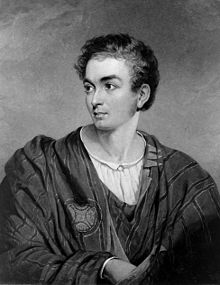Richard Lander
Richard Lander | |
|---|---|
 Richard Lemon Lander in 1835 | |
| Born | Richard Lemon Lander 8 February 1804 Truro, Cornwall |
| Died | Nigeria 6 February 1834 |
| Cause of death | Injuries from a musket ball wound |
| Nationality | British |
| Occupation | Explorer |
Richard Lemon Lander (8 February 1804 – 6 February 1834) was a Cornish explorer of western Africa.
Biography
Lander was the son of a Truro innkeeper, born in the Fighting Cocks Inn (later the Dolphin Inn). Lander's explorations began as an assistant to the Scottish explorer Hugh Clapperton on an expedition to Western Africa in 1825. Clapperton died in April 1827 near Sokoto, in present-day Nigeria, leaving Lander as the only surviving European member of the expedition. He proceeded southeast before returning to Britain in July 1828.
Lander returned to West Africa in 1830, accompanied by his brother John. They landed at Badagri on 22 March 1830 and followed the lower River Niger from Bussa to the sea. After exploring about 160 kilometres of the River Niger upstream, they returned to explore the River Benue and Niger Delta. They travelled back to Britain in 1831.
In 1832, Lander returned to Africa as leader of an expedition organised by Macgregor Laird and other Liverpudlian merchants, with the intention of founding a trading settlement at the junction of the Niger and Benue rivers. However, the expedition encountered difficulties, many personnel died from fever and it failed to reach Bussa. While journeying upstream in a canoe, Lander was attacked by local people and wounded by a musket ball in his thigh. He managed to return to the coast, but died there from his injuries.
In Truro, a monument to his memory by Cornish sculptor Neville Northey Burnard stands at the top of Lemon Street and one of the local secondary schools is named in his honour. The building of the column commenced in 1835.[1] In 1832 he became the first winner of the Royal Geographical Society Founder's Medal, "for important services in determining the course and termination of the Niger".

To mark the 200th anniversary of the birth of Richard Lander and celebrate the Lander brothers’ remarkable achievements an 'Expedition of Goodwill' was sent in November 2004 to retrace their historic river journey.
Publications
- 1829 : Clapperton, Hugh; Lander, Richard (1829). Journal of a second expedition into the interior of Africa, from the Bight of Benin to Soccatoo by the late Commander Clapperton of the Royal Navy to which is added The Journal of Richard Lander from Kano to the Sea-Coast Partly by a More Easterly Route. London: John Murray.
- 1832 : Journal of an Expedition to Explore the Course and Termination of the Niger, reprinted by Elibron Classics [mid-1990s?]
See also
References
- ^ "Lander Monument". West Briton. 27 May 1836. Retrieved 28 December 2012.
